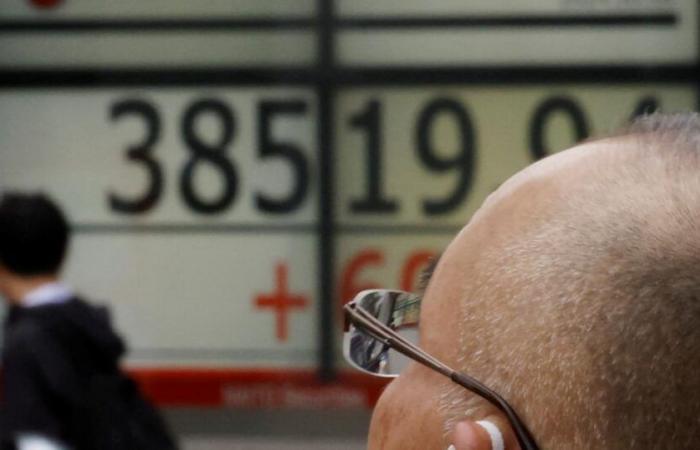Asian stock markets were once again in decline or almost stable on Wednesday while the dollar caught its breath, after the announcement by President-elect Donald Trump of increases in American customs duties targeting China, Mexico and Canada.
Withdrawal in Tokyo, exporters plunge
If the Seoul or Sydney markets stabilized or tried to rebound after having plunged the day before, the Tokyo Stock Exchange continued to decline in a market still shaken by the prospect of increased trade tensions. Around 01:30 GMT, the flagship Nikkei index lost 0.62% to 38,202.06 points and the broader Topix index lost 0.57% to 2,674.25 points, after both had already dropped around 1% the day before.
Donald Trump announced Monday evening that he would increase customs duties on Mexican and Canadian products to 25%, and increase those on Chinese products by 10% in addition to any taxes he could add. Enough to cast a chill on Asian economies like Japan, whose main trading partner is China and which fear being targeted in turn by customs taxes from Washington. “Caution following Mr. Trump’s announcements continues to weigh on the market, which should remain held back by investor mistrust” with regard to actions deemed to be at risk, underlined the experts from Tokai Tokyo Intelligence.
Enough to penalize Japanese automobile manufacturers with factories in Mexico or exporting to the United States, such as Toyota (-2.92%) or Honda (-2.28%). The other large exporting companies were also struggling, due to the strengthening of the yen – which made their prices less attractive: Panasonic (-1.74%), Nikkon (-2.83%), Shiseido (-1.37% )…
The dollar stabilizes, the yen resists
Faced with threats of customs duties, the Mexican peso tumbled on Tuesday to its lowest level since August 2022 against the US dollar, losing up to 2.5%, and the Canadian dollar had plunged to levels not seen in four and a half years. . The two currencies tried to stabilize on Wednesday in Asian trade: the Canadian dollar regained 0.06% (to 1.4045 Canadian dollars per US dollar) and the Mexican peso was standing still (-0.08%) around 01:30 GMT .
The American currency was almost stable against the common European currency, at 1.0489 euros per dollar.
Faced with uncertainties, the yen benefited from its status as a safe haven and continued to strengthen against the greenback: the dollar traded at 152.94 yen (-0.96%). Above all, while the Bank of Japan is preparing to raise its interest rates again in December and the American Fed is engaged in a reduction “gradual” of its own, the gap in yields between the two countries “will continue to encourage investors to sell their dollars to buy back yen”underline the experts of the financial media Nikkei.
Feverish Chinese places
The Chinese stock markets, which had largely digested the prospect of prohibitive customs taxes, remained paralyzed in lackluster exchanges, suspended from possible additional economic support measures by Beijing.
In Hong Kong, the Hang Seng index was in balance around 01:30 GMT (+0.07% to 19,172.14 points). The Shanghai composite index lost 0.31% to 3,249.62 points, and that of Shenzhen lost 0.59% to 1,944.65 points.
Truce agreement in Lebanon: oil and gold without reaction
Oil prices no more than gold prices, although very sensitive to fluctuations in geopolitical crises, did not react to the ceasefire agreement in Lebanon between Israel and Hezbollah. Around 01:30 GMT, the price of a barrel of Brent from the North Sea was standing still (-0.01% to 72.80 dollars), and that of West Texas Intermediate (WTI) lost only 0.10%, to 68, $69.
An ounce of gold remained unchanged at 2,631 dollars (-0.08%). “We note the absence of significant movement after the confirmation of the approval of a truce agreement (by Israel)which suggests that this scenario had already been largely priced in by the market.explains Chris Weston, of broker Pepperstone. In fact, gold had already plunged sharply on Monday.






